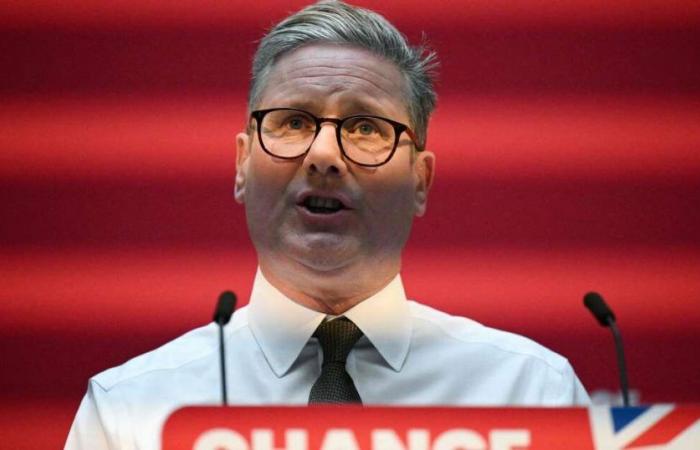“The transformation of the party under Sir Keir is remarkable,” affirms The EconomistThe influential liberal weekly recalls that “In the last election in 2019, under the leadership of Jeremy Corbyn, a leftist, Labour won 202 seats, its worst result since 1935.”
Today, if the polls are correct, Starmer is on the verge of handing Labour a colossal majority and smashing the Conservative Party, which has been in power for fourteen years, to pieces. “He snatched [le Labour] in the clutches of the extreme left, adds the Daily Maila very right-wing tabloid. He ousted Jeremy Corbyn and tackled the cancer of anti-Semitism that was eating away at the party, with some success.”
Often mocked by the press for his nasal voice and bodily stiffness – “as many have noticed, he is a strangely android being,” laughs a columnist of the Spectator – Starmer, born in London in 1962 to a toolmaker father and a nurse mother, is said to be “the most ‘working class’ leader of the Labour Party in a generation, and also the first in its history to have the prefix ‘sir’ attached to his name before taking office,” remember The Guardian. After studying law at Leeds and Oxford, Starmer flirted with Trotskyist and anti-monarchist movements during his youth, but entered political life late. A brilliant lawyer, human rights defender since the late 1980s, Attorney General of the United Kingdom from 2008 to 2013, he was knighted in 2014 by Queen Elizabeth II.
“He is worse than Blair”
With the help of his neighbour from the bourgeois Kentish Town district, Ed Miliband, then leader of the Labour Party, he entered the House of Commons in 2015, at the age of 52. Under Corbyn, Miliband’s successor who was even more left-wing than him, he became the Brexit referent with the mission – a failed one – of obtaining the organisation of a second referendum. Following the electoral snub of 2019, which benefited Boris Johnson, he succeeded Corbyn in January 2020, whom he ousted from the party after the publication of a report denouncing his insufficient response to the anti-Semitism affairs within Labour.
“First Past the Post”: Elections, a user guide
“Prepare for the most disproportionate results ever”throw it Financial Times. On Thursday 4 July, voters in England, Wales, Scotland and Northern Ireland will go to the polls to renew the House of Commons of the United Kingdom. Under the first-past-the-post system, known as “First Past the Post”, the candidate who comes out on top in each of the 650 constituencies will join the Green benches of Westminster.
The press has been expecting a Labour landslide for weeks, including in Scotland, where the pro-independence Scottish National Party (SNP) is struggling. All the polls, without exception, give a comfortable lead of at least 16 points to Labour, the main opposition party. Next come the outgoing Conservative majority and the right-wing populist Reform UK party, neck and neck, then the Liberal Democrats. “But there could be a big difference between the combined votes and the number of seats obtained, warns the economic newspaper. Labour is set to secure a ‘super majority’ with fewer votes than they lost in the 2017 general election. And the Liberal Democrats could form the second largest group in parliament while finishing fourth in votes.
This is the law of the “FPTP”, contested for its lack of representativeness, and which tends to punish the scattering of votes, as is the case on the right. “As the British political landscape becomes more fragmented away from the traditional Labour-Tory two-party system, the criticism will become increasingly difficult to ignore.”
Courrier International
Show more
Elected on a left-wing platform, he is gradually refocusing the party. Previously in favour of the renationalisation of public services such as the Post Office, energy and water, Starmer is now only aiming for the return of certain privatised railways to the “common property”. His U-turns also cast doubt on the increase in income tax for the richest 5% of employees, the moratorium on any new oil and gas exploration in the North Sea, the self-identification of trans people, lists, dejected, the committed magazine The Big Issue.
“More What does Keir Starmer actually represent?” asks a frustrated columnist for the pro-labor weekly. The New Statesman, who doesn’t have the answer. “He’s actually worse than Blair, and I say that as someone who despises Blair. He’s certainly more dishonest,” enrages a journalist from Morning Starcommunist daily. “I suspect he understands that being boring is a huge asset, especially after Corbyn.”slips an old school friend into The Times.
“His positions are so contradictory,” fulminates the columnist of The Spectator, “so obviously motivated by opportunism: I like Corbyn/I never liked Corbyn, I accept the result of the referendum [sur le Brexit]/I don’t accept the result of the referendum, a man can be a woman/a man can’t be a woman. You end up wondering: why does he want power? Who is he? If we could get a sense of his real secret plan, if he couldn’t help but blurt it out, it would make him look like a person. But there’s no common thread in his flip-flops and broken promises. He’s just there, saying whatever it takes to get through the day.”






